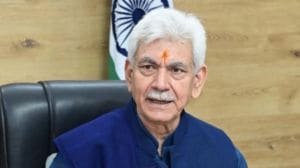As UN tightens noose,rebels learn the ropes
Libya: Gaddafi faces sanctions,Oppn starts process of provisional govt.
As the 15-member UN Security Council,including India,today unanimously slapped biting sanctions on the Muammar Gaddafi regime,the Libyan opposition movement tightened its control around capital city Tripoli. It also formed a transitional national council to act as the face of the revolution,though clarifying that it was not an interim government.
Hundreds of armed anti-government forces backed by rebel troops who control the city closest to Tripoli appeared to be heading towards a siege of the capital and prepared for an expected offensive by forces loyal to the 41-year-old regime of 68-year-old Gaddafi.
As more cities fell into the hands of the opposition,the pro-democracy protesters appointed ex-justice minister Mustafa Abdel-Jalil to lead a provisional government. Abdel-Jalil said he was forming a transitional government to replace the crumbling regime.
In the eastern city of al-Baida,Jalil said the new administration would include commanders of the regular army,many of whom had defected to the opposition,and the set-up would pave the way for free and fair elections in three months,Al-Jazeera said.
The online edition of Libyas Quryna newspaper said Ajleil had led the formation of an interim government based in Benghazi.
Hafiz Ghoga,the spokesman for the new National Libyan Council formed after a meeting of Gaddafi opponents in the eastern city of Benghazi,said the main aim of the national council is to have a political face… for the revolution.
We cannot call it an transition government. It is a national council, Ghoga told a news conference after the gathering. Ghoga described Ajleil initiative as his personal view.
At the United Nations,a resolution seeking an arms embargo,travel and assets ban and a crimes against humanity probe was passed unanimously early this morning. The Security Council had spent the entire day yesterday working on the Libya resolution,prepared by France,the UK,Germany and the US.
The sanctions include freezing of assets of the 68-year-old Gaddafi and his family,a ban on travel by the Libyan leader and his family as well as other leaders of the Libyan regime,a comprehensive arms embargo and an immediate referral to the Hague-based International Criminal Court (ICC) for a crimes against humanity probe.
We deplore the use of force,which is totally unacceptable, Hardeep Singh Puri,Indias Ambassador to the UN, said at the Council after the resolution was approved.
The main bone of contention during the discussion was the immediate referral to the ICC,since some countries in the Security Council,including India,China,the US and Russia,are not members of the tribunal.
India,however,relented after the resolution was modified to include that the Security Council could defer ICC action for a period of 12 months and renew that deferral.
The resolution also states that non-Libyan nationals from a country which is not a party to the Rome Statute,that set up the ICC,shall only be subject to jurisdiction of that state for any crimes committed in Libya in operations authorised by the Council.
We would have preferred a calibrated and gradual approach, Puri told the Council,noting that 114 out of the 192
nations of the UN are not members of the ICC.
The envoy,however,added that India had gone along with the consensus in the Council because African and Arab states wanted to refer the matter to the ICC,and this was also what Libyan envoy Mohamed Shalgam had asked for in his letter sent to the Council yesterday.
Susan Rice,US envoy to the UN,pointed out that this was the first time a resolution referring a case to the ICC had passed unanimously. The vote also saw the US backing referral of a crisis case to the International Criminal Court for the first time.
Under the sanctions,the travel ban and assets freeze in Resolution 1970 will target Gaddafi,his sons and daughter
Aisha,other family members and top defence and intelligence officials blamed for the bloodshed. There are 16 names on the sanctions list. The figure was cut from 22 during negotiations yesterday.






- 01
- 02
- 03
- 04
- 05

























